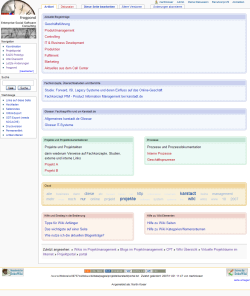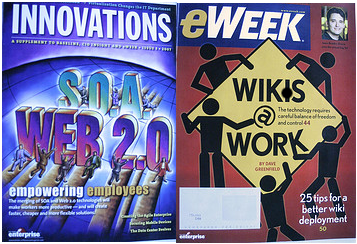As I am pondering the program for the next Wiki Wednesday Stuttgart with the special topic of “project management and social software” I thought it’s a good idea to collect some ideas and observations in advance.
This is timely, as using social software for project work is a recurring theme in most client talks of late, i.e. it’s a common theme when people are pondering and probing the opportunities of social software in the enterprise. And it’s a good source of examples, especially for the workshop I am doing together with Oliver Gassner on February 18 (register here).
 So I thought it a good idea to compile some information and experiences on using social software in project management (yes, most of this is may be valid also for multiproject- or program management, like in this actual project portal I did, depicted on the left).
So I thought it a good idea to compile some information and experiences on using social software in project management (yes, most of this is may be valid also for multiproject- or program management, like in this actual project portal I did, depicted on the left).
Project management of course entails different types of activities, of which only some (dare I say most?) can be supported and enhanced with social software like blogs or wikis. And yes, social software uses for project management should ideally be evaluated from the perspectives of diverse target groups (like project members, managers, program managers, a diverse set of stakeholders etc.), but let’s focus on actual project managers this time. So I will focus on usage arenas for blogs and wikis, keeping in mind that these two are only parts of a more elaborate and naturally interlinked social software toolkit for the enterprise (which needs to be applied via effective and elaborate consulting, yes – naturally too). Moreover, the way to go isn’t project blogs OR project wikis OR social networking in projects OR whatever/younameit – so I may write about social bookmarking, social networking platforms, folksonomies or RSS for general project management later on, stay tuned.
OK, then, as activities and tasks of project managers are diverse, perhaps they’re best viewed from the general perspective of an (ideal, virtual) project room that tries to bundle and organize different activities on an integrated platform.
Now, blogs are ideally suited for project communication by project managers, who always need to keep stakeholders and project workers informed. Blogs are an alternative to email for asynchronous communication, especially the sort of 1:m communication that email doesn’t handle well. So the project blog becomes the main communication tool, documenting and tracking the project and the learnings made, and helps in constantly keeping the project status clear.
Wikis are good at fostering collaboration and building up shared understanding. Wiki pages can be collectively defined, refined, explored, tested, and built upon. They are an adaptive platform that can be customized to specific contexts and needs, and emergent and freeform usage patterns, i.e. ever changing (ad hoc) activities, processes and work practices. Wiki pages can be opened easily and securely to partners, customers, suppliers and more – in fact using a wiki as a defacto intranet application makes it easy to extend it into an easy and lightweight extranet, that allows firewall crossing when needed – like when working with project team members that are based outside the organizational boundaries.
Yes, neither project blogs or wikis are meant to replace traditional project management suites or web 2.0-ish platforms like Basecamp. Yet they offer plenty of opportunities to handle and enhance common project management activities, especially those that imply communication, coordination and collaboration tasks – the key elements of actual project manager work. Together they can be used in communicating (blog) and documenting (wiki) milestones, capturing (blog) and organizing (wiki) learnings and issues, and much more.
Now these are only some initial starting points, as I don’t want to spoil the actual wiki wednesday experience – but feel invited to add more points and issues for using social software in project management, either here in the comments or over at the wiki wednesday wiki.

